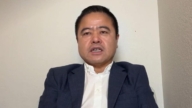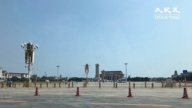【新唐人2012年1月17日讯】中共国务院总理温家宝15号在出访沙特阿拉伯时表示,支持“阿拉伯之春”人民变革诉求,温家宝的谈话引起外界极大的关注。
15号,在与伊斯兰合作组织秘书长伊赫桑奥卢(Ekmeleddin Ihsanoglu)会谈时,温家宝表示,中方“呼吁停止一切针对平民的暴力行为,支持有关国家人民的变革诉求。”他希望“并且相信地区国家的政府和人民,有能力解决自己的问题。”
温家宝的讲话虽然简短,但这是阿拉伯世界爆发“茉莉花革命”一年以来,中共官员唯一公开表达支持阿拉伯人民的变革诉求。
温家宝这番言论是官话?还是真心话?在目前的国际形势下又包含着什么意思?引发各界极大的关注和解读。
香港《动向》杂志主编张伟国认为,这显然是官话。
张伟国:“他现在是在国外访问,那么他的言行都是代表了中国政府的外交。因为阿拉伯已经变天了,新的政府中国还要打交道。如果不承认的话,就是意味着和这些新政府没办法建立正常关系。所以这个应该讲是一种官话。”
温家宝这次出访沙特、阿联酋、卡塔尔正好是西方国家加紧制裁伊朗的时刻, 伊朗目前是中国第三大原油供应国,仅次于沙特阿拉伯和安哥拉。根据美国能源情报署的数据,2010年,中国是伊朗石油最大的出口市场。
美国希望获得中国支持,削减从伊朗购买石油,由于欧盟和其他国家也愿意考虑大幅削减进口伊朗石油,如果中共还试图保持与伊朗的关系,那么就将处于与西方大多数大经济体对抗的境地。因此,温家宝这次访问中东三国,也被看作是中共为解决能源供给而走的新布局。
《纽约时报》14号说,中共上周断然拒绝参与美国发起的制裁伊朗行动,并要求就伊朗核计划问题举行更多谈判。
“美国纽约城市大学”政治学教授夏明认为,温家宝的讲话中也透露出中共的这一态度。
夏明:“他讲的其他外国不要卷入,那么也就是说他其实是针对美国的,针对西方国家,尤其是北约那个组织的。我觉得他第二个意思就在于,他是反对西方国家对第三世界国家的干预,因为这个直接对中国形成一种威胁。”
夏明教授分析,温家宝还想暗示,中共当局有能力解决国内社会矛盾。但卡扎菲和穆巴拉克,以及叙利亚目前的情况已经证明,显然独裁政权是无法解决这个问题的。
夏明:“中国目前,我们看到乌坎也死了人,西藏这边的藏人,过去一年就有16起自焚事件现在已经发生了。温家宝他如果要向国际社会表明,或者如果能够说服国际社会,中国能够解决这些问题的话,那么我想首先这些悲剧,这些自焚悲剧,和这些杀人的悲剧,那么首先就应该制止。我觉得这一点恐怕是最关键的。”
温家宝还说,中共与伊斯兰合作组织在维护西亚、北非地区和平与稳定方面有着共同利益。夏明教授认为,虽然双方在抗衡西方话语体系上可能形成统一,但认为“天下穆斯林都是一家”的伊斯兰教国家,和镇压、虐待中国伊斯兰教徒的中共,在宗教层面的冲突,将是双方合作中巨大的挑战。
新唐人记者常春、尚燕、孙宁采访报导。
Interpreting Wen’s Support of “Arab Spring”
Upon visiting Saudi Arabia on 15th, Chinese Premier
Wen Jiabao expressed support for the “Arab Spring."
Wen’s remarks received great attention from the public.
Wen talked with Ekmeleddin Ihsanoglu, Secretary-General of
Organization of the Islamic Conference.
Wen said China “calls for terminating any violence against
civilians, and supports the efforts of reform in many countries.”
He expressed the belief that regional governments have the
ability to solve their own problems.
In the past year after Arabian world’s “Jasmine Revolution”, this
is the first time that Chinese officials publicly expressed support.
Is Wen’s remark formulaic diction or sincere expression? What
does it indicate in the current international situation?
Wen’s words have given rise to great concerns and interpretations.
Zhang Weiguo, chief editor of Hong Kong magazine “Trends",
takes it to be ideological term.
He is now on a diplomatic visit to these countries.
His words and deeds naturally represent Chinese government.
Now the Arabian world has undergone sweeping changes.
If China refuses to recognize this change, it cannot establish
normal relationships with them. So this is only diplomatic diction.
Wen visited Saudi Arabia, UAE, and Qatar when
Western countries strengthened boycott against Iran.
Iran is now China’s third largest crude oil supplier, following
Saudi Arabia and Angola.
According to U.S. Energy Information Administration,
China is Iran’s largest oil export market in 2010.
U.S. asked China’s cooperation to reduce purchasing oil
from Iran.
When EU and U.S. reduce oil imports from Iran,
China would be opposing them to cooperate with Iran.
Therefore, Premier Wen’s visit to the Middle East is seen
as CCP’s new energy strategy.
The New York Times said on 14 that CCP firmly refused to
participate in the U.S.-initiated boycott.
Requiring more talks over the Iranian nuclear issue.
Xia Ming, professor of political science at City University of
New York, said Wen’s speech revealed such an attitude of CCP.
Wen stressed that other countries should not get involved.
He is actually referring to the U.S., other Western countries, and NATO.
I feel he also indicates opposing Western countries’ intervention
in the Third World countries, which directly threatens CCP’s rule.
Professor Xia Ming also says, Wen wants to suggest that Chinese
authorities have the ability to solve domestic social conflicts.
However, Gaddafi, Mubarak, and the current situation in Syria
demonstrated authoritarian regimes can not solve the problems.
Now we’ve seen that some people died in Wukan;
last year saw 16 Tibetan self-immolations.
To convince the world of its ability, CCP first needs to solve
the problems behind these tragedies.
I think this is probably the key issue.
Wen also said CCP shares common interests with Islamic
Cooperation Organization in maintaining peace in West Asia and North Africa.
Prof. Xia believes that although both sides compete with the West,
CCP persecutes Muslims within China.
Religious conflicts will significantly impede their cooperation.
NTD reporters Chang Chun, Shang Yan and Sun Ning




























